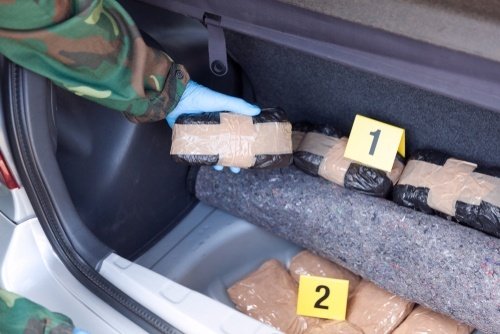In this section, our attorneys explain Nevada’s criminal laws and legal concepts, A to Z
Please note: Our firm only handles criminal and DUI cases, and only in California. We do not handle any of the following cases:
- civil matters
- CCWs or gun right restoration
- labor
- family law
- immigration
- landlord/tenant
- harassment
- restraining orders
And we do not handle any cases outside of California.
Call Us Now4 times when Nevada police can search your trunk
Posted on
- The police have probable cause,
- The driver consents,
- The police have a search warrant, and/or
- The police are doing an inventory

1. The police have probable cause to believe a crime has been committed
The police may search all parts of a person’s car, including the trunk, if the police have “probable cause” to believe a crime has or is about to occur.[1]
Merely citing a driver for a traffic violation does not automatically give police probable cause to search the trunk.[2] There need to be other circumstances that give rise to a reasonable suspicion that a law is being broken, such as:
- During a traffic stop, the police smell marijuana coming from the vehicle,
- During a traffic stop, the police see drugs or other contraband through the windows in the car,
- The police witness someone putting contraband in the trunk, and/or
- The driver confesses to a crime
Once a police officer has probable cause, the officer can perform the search of the entire car including the trunk without getting a warrant first. The reason for this “warrant exception” is to prevent the driver from driving away during the time it takes for the officer to secure a warrant.[3]
2. The driver consents to the police searching the trunk

If a police officer asks a driver to search the trunk and the driver answers yes, then the search is legal. It makes no difference if the officer had no probable cause or was not able to get a warrant first.[4]
Therefore, people are always advised to politely decline when police ask them to search their trunks. This way, the police may not be able to search the trunk unless the police have probable cause or can get a warrant.
3. The police have a warrant to search the trunk
If the police get a valid search warrant to search a car, then the police may legally search the trunk. It makes no difference if the driver does not give his/her consent or is not present at the time.
Typically, police do not get warrants to search cars. This is because they are allowed to conduct warrantless searches as long as they have probable cause to believe a crime has been committed.
But if the vehicle is parked and there is no driver present, courts prefer that police get a warrant first before searching the car. This is because parked cars are not as “fleeting” as cars on the road, and therefore police do not have a good excuse to with dispense with the warrant requirement.[5]
4. The police were performing an inventory search after impounding the car

When police impound a car…such as after a DUI arrest…police may inventory the contents of the vehicle in order to safeguard the defendant’s possessions. When doing an inventory, police do not need a warrant nor probable cause in order to search the trunk.
If the police happen to find suspicious evidence while doing an inventory…such as drugs…prosecutors may be able to use this evidence against the defendant to bring new criminal charges or to support existing ones. However, the judge could exclude this evidence if a criminal defense attorney can show that the police exploited this “inventory exception” as an excuse to search for incriminating evidence.[6]
Legal References
- U.S. v. Ross, 456 U.S. 798 (1982)(“[I]f probable cause justifies the search of a lawfully stopped vehicle, it justifies the search of every part of the vehicle and its contents that may conceal the object of the search[.]); Carroll v. U.S., 267 U.S. 132 (1925)(“[C]ontraband goods concealed and illegally transported in an automobile or other vehicle may be searched for without a warrant[.]”).
- Knowles v. Iowa, 525 U.S. 113 (1998)(“But while the concern for officer safety in this context may justify the “minimal” additional intrusion of ordering a driver and passengers out of the car, it does not by itself justify the often considerably greater intrusion attending a full fieldtype search.”).
- See Fletcher v. State, 115 Nev. 425, 990 P.2d 192 (1999)(“[A] warrantless search of a parked, immobile, unoccupied automobile requires: (1) probable cause to believe that the vehicle contains contraband; and (2) exigent circumstances sufficient to dispense with the need for a warrant…[A]lthough there may have been probable cause to believe criminal evidence was in the vehicle, there were no exigent circumstances sufficient to dispense with the need for a separate warrant because the opportunity to search the car was not “fleeting.”).
- See Harper v. State, 84 Nev. 233,| 440 P.2d 893 (1968)(“At the time, the driver…gave his consent to an examination of the trunk of the automobile[…]”).
- See Allen v. State, 91 Nev. 78, 530 P.2d 1195 (1975)(“The officer who was dispatched to recover the car found it, placed evidence seals on the trunk lid and all doors, and had it towed back to Las Vegas where it was searched pursuant to warrant, and photographed.).
- Weinstraub v. State, 110 Nev. 287, 871 P.2d 339 (1994)(“[P]olice officers need not comply with the Fourth Amendment’s probable cause and warrant requirements when they are conducting an inventory search of an automobile in order to further some legitimate caretaking function.”); Heffley v. State, 83 Nev. 100, 423 P.2d 666 (1967)(“If, however, the policing conduct indicates that the intention is exploratory rather than inventory the fruits of that search are forbidden.”).
About the Author

Neil Shouse
A former Los Angeles prosecutor, attorney Neil Shouse graduated with honors from UC Berkeley and Harvard Law School (and completed additional graduate studies at MIT). He has been featured on CNN, Good Morning America, Dr Phil, The Today Show and Court TV. Mr Shouse has been recognized by the National Trial Lawyers as one of the Top 100 Criminal and Top 100 Civil Attorneys.

